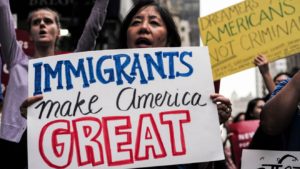
Earlier this week, the Supreme Court dismissed a case involving a controversial Trump- era rule that makes it more difficult for immigrants to obtain legal status if they use certain public benefits such as Medicaid, food stamps, and housing vouchers.
Last month, the Supreme Court Justices concurred to take up a challenge to the ‘public charge’ rule brought by The Legal Aid Society, multiple groups as well as state and local officials. However, in a brief letter to the court, Acting Solicitor General, Elizabeth Prelogar informed the justices that both sides had agreed that the challenged should be dismissed.
Susan Welber, a staff attorney at the Legal Aid Society, stated in an interview that the new filing means that the Trump rule will “now be blocked while the Biden Administration continues its review process and decides what the new will be.” President Biden has called for the immediate review of the rule in an executive order which he said, “should consider and evaluate the effects of the rule and recommend steps agencies should take to clearly communicate current public charge policies and proposed changes, if any, to reduce fear and confusion among impacted communities.”
The Legal Aid Society along with other groups praised Biden’s actions and expressed in a statement that “the Trump rule erected an invisible wall in the form of a wealth test that discriminated against people on the basis of race as a condition for regularizing their immigration status. And because of the public charge rule, immigrant families have been living in fear of using essential benefits like healthcare, despite serving as frontline workers who have been among those hardest hit by COVID-19.”
The Trump rule was issued in 2019 and has been in effect in most states since Federal lawmakers at that time wanted to ensure that immigrants would be able to take care of themselves instead of being a public burden.
Under the regulations put in place in 1996, the term ‘public charge’ was defined as someone who is primarily dependent on government assistance. However, it only included cash benefits such as Temporary Assistance for Needy Families or Supplemental Security Income from Social Security, the Trump administration rule widened the definition by including more benefit programs.
Advocates among several states that opposed the rule stated that the change would penalize immigrants who rely on temporary assistance from the government and impose costs on the states. Immigrant advocates have since warned of the rule’s chilling effect on communities stating that in some cases, immigrant families avoided public benefit programs such as Medicaid and the Children’s Health Insurance Programs in fear of risking future green card status.

Recent Comments